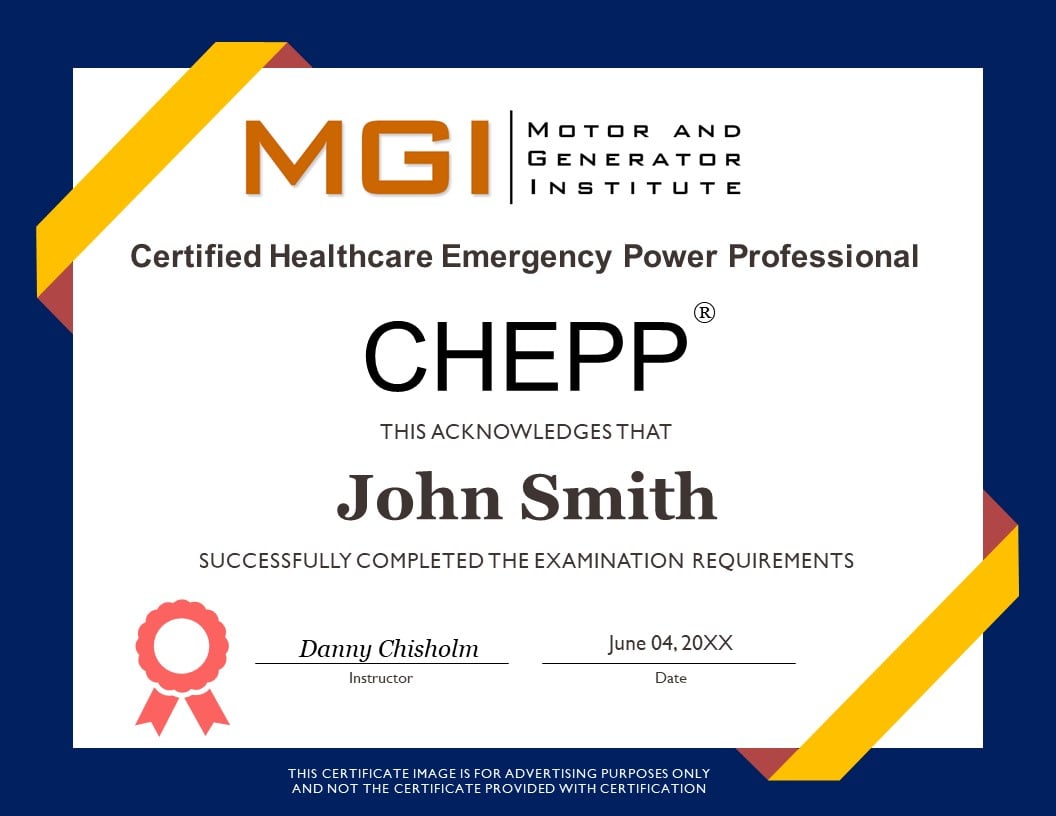
The Certified Healthcare Emergency Power Professional (CHEPP®) program highlights your experience and knowledge of emergency power supply systems (EPSS) in the healthcare industry. We encourage you to identify yourself as a Certified Healthcare Emergency Power Professional (CHEPP®) upon completing the CHEPP online program. Use your CHEPP® designation after your name and incorporate your certification into your resume or curriculum vitae.
There are 170+ different Emergency Power Supply System (EPSS) requirements. The CHEPP® ensures you understand these requirements. In the creation of the CHEPP® program, MGI used the following references:
Codes and Standards: The CHEPP® covers all applicable paragraphs in the current editions of NFPA 99, Health Care Facilities Code® (2012-2024 Edition), NFPA 110, Standard for Emergency and Standby Power Systems (2010-2022 Edition), and current OSHA regulations.
Safety: Make sure you follow NFPA and OSHA requirements for training and safety of personnel, including specific PPE recommendations.
Maintenance: Each component of the EPSS (batteries, cooling, fuel, etc) requires specific tasks to be performed at certain intervals.
Inspections: Performing a visual inspection of your EPSS on a weekly basis is a MUST. Use MGI’s weekly inspection checklist to discover issues before the next generator run.
Testing: Monthly and triennial testing are essential to extending the life of your EPSS and uncovering under-performing items before the next emergency. Also, documentation is REQUIRED for AHJ compliance.
Health Care Facilities: NFPA 99 requirements and breakdown of the Essential Electrical Distribution System (life safety, critical, and equipment branch) and what circuits belong to each.
The certifications program contains multiple video lessons, a downloadable study guide, and practice questions. The final exam is timed (2-hrs) and open book. We recommend students have a copy of NFPA 99 and NFPA 110 with them during the exam.
Students who successfully pass the 100-question final exam are issued a certificate from Motor and Generator Institute. Print the certificate from our website for documentation and proof of training to the AHJ. Each student also receives the 37+ video online course and practice quizzes.
Once individuals have earned their certification, they may use it for professional communications, such as letterheads, office stationery, business cards, directory listings, and signatures.
The entire program is online and self-paced. However, the course is only open for 60 days. During the 60 days, students will have the opportunity to ask the instructor questions.
“I truly enjoyed the training and got a lot out of it using our emergency power supply system here as a template. Also, it has allowed me to push forward changes at our facility. Thank you” Brian, CHEPP
“Thank you for offering this program! With so many codes to reference… that are constantly changing, along with so many requirements that each AHJ enforces, this was a great way to review all pertinent information in one place and to have as a reference in the future.” Eric, CHEPP
“Thank you for the training program. I am proud to earn this designation and look forward to continuing my knowledge, but also help our industry progress and make our facilities safer!” Odell, CHEPP
The main documents covered in this include the NFPA 99, Health Care Facilities Code, 2024 Edition, and NFPA 110, Standard for Emergency and Standby Power Systems, 2022 Edition.
Participants have 60 days from the start of the course to complete all lessons and the final examination. This period allows for flexible pacing to accommodate professional schedules.
The final exam is a timed, open-book test consisting of 100 questions. Participants have two hours to complete the exam, and a minimum score of 70% is required to pass and receive the certification.
The course is entirely online, featuring video lessons, downloadable study guides, and practice quizzes. The online format is designed to be self-paced, allowing learners to engage with the material at their convenience.
Yes, individuals who earn the CHEPP® certification are encouraged to use the CHEPP® designation after their names on resumes, business cards, and professional correspondence to signify their specialized knowledge and certification status.
Support is available throughout the course duration. Participants can submit questions which will be addressed by the instructor. This ensures that all students receive the help they need to fully understand the course material and succeed.
There are no formal prerequisites for enrolling in the CHEPP® course. However, having some background in healthcare facility management, emergency power systems, or related fields can be beneficial.
Obtaining the CHEPP® certification can enhance your professional credibility, improve career opportunities, ensure compliance with health and safety regulations, and equip you with the skills necessary to manage and maintain emergency power systems effectively in healthcare settings.